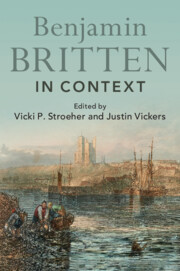Book contents
- Benjamin Britten in Context
- Composers in Context
- Benjamin Britten in Context
- Copyright page
- Dedication
- Contents
- Figures
- Tables
- Notes on Contributors
- Acknowledgements
- Bibliographic and In-Text Abbreviations
- Prologue
- Part I The Britten Circle(s)
- Part II British Musical Life
- Part III Britten and Other Composers
- Part IV Wordsmiths, Designers, and Performers
- Chapter 24 W. H. Auden
- Chapter 25 Eric Crozier
- Chapter 26 Two Librettists
- Chapter 27 The Wise, Queer Heart of Englishness
- Chapter 28 William Plomer’s Poetics of Exile at Home
- Chapter 29 ‘Don’t Colour Them, the Music Will Do That’
- Chapter 30 Designing and Dancing Britten
- Chapter 31 Pears as Illuminator, Interpreter, and Inspiration
- Chapter 32 Britten’s Singers
- Chapter 33 Britten’s Performers: Those Most ‘Instrumental’
- Part V British Sociocultural, Religious, and Political Life
- Further Reading
- Index
Chapter 27 - The Wise, Queer Heart of Englishness
E. M. Forster
from Part IV - Wordsmiths, Designers, and Performers
Published online by Cambridge University Press: 31 March 2022
- Benjamin Britten in Context
- Composers in Context
- Benjamin Britten in Context
- Copyright page
- Dedication
- Contents
- Figures
- Tables
- Notes on Contributors
- Acknowledgements
- Bibliographic and In-Text Abbreviations
- Prologue
- Part I The Britten Circle(s)
- Part II British Musical Life
- Part III Britten and Other Composers
- Part IV Wordsmiths, Designers, and Performers
- Chapter 24 W. H. Auden
- Chapter 25 Eric Crozier
- Chapter 26 Two Librettists
- Chapter 27 The Wise, Queer Heart of Englishness
- Chapter 28 William Plomer’s Poetics of Exile at Home
- Chapter 29 ‘Don’t Colour Them, the Music Will Do That’
- Chapter 30 Designing and Dancing Britten
- Chapter 31 Pears as Illuminator, Interpreter, and Inspiration
- Chapter 32 Britten’s Singers
- Chapter 33 Britten’s Performers: Those Most ‘Instrumental’
- Part V British Sociocultural, Religious, and Political Life
- Further Reading
- Index
Summary
E. M. Forster’s friendship with Benjamin Britten reached its creative high point in the Forster-Crozier collaboration on the Billy Budd libretto; tried in this crucible, it remained cordial until Forster’s death. As homosexual artists and public figures at the cultural centre of a homophobic society, they were linked by their shared belief in democratic values and civic freedom, their opposition to totalitarian forces and ideas, and their persistent questioning of hegemonic discourses. With minds broadened and hearts sensitised by personal experience and international connections, they recognised the importance of compassion in all human relations, and were able to address and inspire audiences from all walks of life. Both engaged with the idea of Englishness while rejecting nationalistic sentiment and intellectual bigotry, and produced works which – sadly – remain topical in their denunciation of the toxic aspects of our global masculinist culture. This chapter presents a brief introduction to E. M. Forster, author, critic, radio broadcaster, and public intellectual, with a special focus on how his work and his personal relations intersected with those of Benjamin Britten.
Keywords
- Type
- Chapter
- Information
- Benjamin Britten in Context , pp. 241 - 248Publisher: Cambridge University PressPrint publication year: 2022

